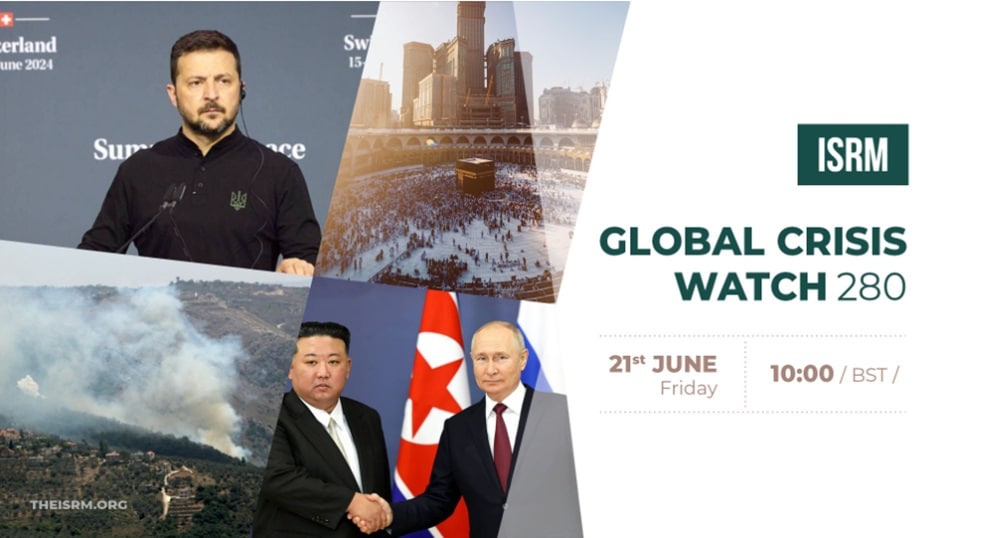The Institute of Strategic Risk Management (ISRM) is inviting security professionals and members to its latest Global Crisis Watch, number 280, taking place online tomorrow, Friday, June 21, at 10.00am BST. Key topics for discussion will include the Ukraine Peace Summit, which failed to reach expectations, the recent signing of a strategic deal between Russia’s President Putin and North Korea’s Kim Jong Un, flaring tensions between Israel and Lebanon, and pilgrims suffering heatstrokes when attending the Hajj, highlighting Global Warming effects. See more detail on these topics below.
The Ukraine Peace summit fails to reach expectations
Russian President Vladimir Putin’s visit to North Korea marked a significant moment in bilateral relations, culminating in the signing of a comprehensive strategic partnership with Kim Jong-un. The agreement includes a mutual defense clause, described by Kim as cementing an alliance between the two nations. This development has sparked concerns in Western capitals over increased military cooperation, potentially involving North Korean munitions support for Russia’s efforts in Ukraine. Amid international sanctions and geopolitical tensions, Putin and Kim’s public ceremony underscored their countries’ deepening ties, with both leaders exchanging symbolic gifts and emphasizing historical ties dating back to Soviet support during the Korean War. The visit underscores Russia’s strategy of fortifying alliances to navigate global isolation and sustain its geopolitical influence amid ongoing conflicts.
Putin Met Kim Jong Un to sign a strategic partnership deal
The recent Ukraine peace summit in Burgenstock, Switzerland, brought together around 90 countries to discuss a path toward ending Russia’s invasion of Ukraine. Despite efforts to build international consensus around a peace plan led by Kyiv, significant challenges emerged. Russian President Putin reiterated his stance against the effort, highlighting the stark divide between the parties. While 84 nations signed a communique supporting Ukraine’s territorial integrity, key countries like Saudi Arabia, India, and South Africa abstained, and China did not attend. President Zelensky remained hopeful, emphasizing continued diplomatic efforts and the importance of strong peace. The summit identified three focal points for future discussions: protecting food exports, securing nuclear sites, and accelerating the return of prisoners and displaced children. Despite the mixed outcomes, Zelensky reiterated Ukraine’s commitment to peace without surrender, amidst ongoing battlefield pressures and slow Western military aid.
Tensions are flaring between Israel and Lebanon
Recent tensions between Israel and Hezbollah have escalated significantly, characterized by frequent cross-border clashes and heightened military engagements. U.S. envoy Amos Hochstein’s diplomatic efforts seek to mitigate the risk of a wider conflict, despite ongoing provocations such as Israeli airstrikes and Hezbollah rocket attacks. These incidents have resulted in casualties on both sides and underscore deep-rooted animosities exacerbated by regional dynamics involving Iran. While neither Israel nor Hezbollah appears eager for all-out war, the situation remains precarious, with potential for further escalation due to internal and external pressures. The international community, particularly the U.S., continues to play a crucial role in attempting to de-escalate tensions and prevent a broader regional conflict. The election of a new Iranian president on 28th June is expected to see another hard-liner in place. Although limited in their political power, Iranian presidents can set the tone of the nature of the dialogue between Iran and the international community and given the possibility that the new president could be a former head of the Revolutionary Guard, that could mark an increasingly prominent role for military activity on Iran’s strategic playbooks.
Thousands of pilgrims suffer heatstrokes when attending the Hajj, highlighting Global Warming effects
During this year’s Hajj pilgrimage in Saudi Arabia, at least 550 pilgrims tragically lost their lives due to extreme heat, underscoring the grueling conditions faced annually during this sacred event. The fatalities primarily affected Egyptians, with 323 reported deaths attributed to heat-related illnesses, exacerbated by temperatures reaching 51.8 degrees Celsius at the Grand Mosque in Mecca. Jordanians also suffered losses, with the total death toll reaching 577 according to various reports. The Hajj, a pillar of Islam, saw over 1.8 million participants this year, highlighting the challenge of managing such large crowds under increasingly severe climate conditions, exacerbated by the effects of climate change. Similar challenges are expected to impact on the Paris Olympics, being held from 26th July to 11th August, with heat a major factor in considering the safety and well-being both of athletes and spectators.
To register for the Global Crisis Watch, click here
For more ISRM news, click here





